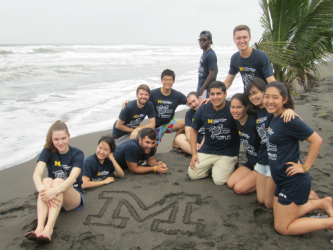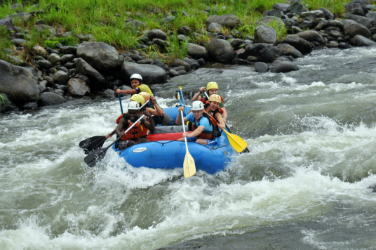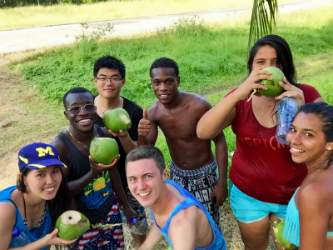Why did you pick this program?

I chose the sea turtle conservation project in Costa Rica through International Volunteer Headquarters (and their in-country partner, Máximo Nivel), because IVHQ offered the most affordable programs and the staff were very helpful and easy to work with.
I also knew that I would likely never again get an opportunity to help with a sea turtle conservation program, and I have always had a love for marine biology, so it was natural that I chose to pursue the turtle project … in one of the most biologically-diverse and –dense regions of the world. I also enjoy volunteering outdoors.
What do you wish someone had told you before you went abroad?
I wish someone had told me what the exact project work would involve when we would be there so that I could have prepared to help organize additional projects we could have done more of in our free time during the day.
So, I would recommend getting as much of that information as possible before your own trip so that you could prepare to bring any extra supplies that might be needed for those projects (that might be hard to get while in-country).
What is the most important thing you learned abroad?

I think the most important thing I learned while abroad was that our ways of life are just different from one another, and that one is not better than the other. Although I went into my experiences with an open mind, the first time I was abroad both opened it wide and prevented it from closing, so to speak.
My international experiences have allowed me to form more meaningful and understanding relationships with people, as well as give me the courage to pursue any new adventure, domestic or abroad.
What do you tell your friends who are thinking about going abroad?
I push them to do it, as this is one area where peer pressure is a positive thing. Besides considering the costs of traveling abroad, the thing that has kept some of my friends reluctant from going abroad is the fear of the unknown in a new language (most often) and cultural context.
I share with them some of my stories and how I shared the same fear, but how it almost instantly dissolved when meeting my loving host families and beginning my new experience. It's a fear that will quickly dissolve once you arrive at your destination.
What was the hardest part about going abroad?
For me, the hardest part about going abroad, for the first time by myself, was leaving my family and friends behind. I did experience some homesickness, which is a natural part of the process, but engaging with my awesome host families and keeping busy in the experience cured that quickly.
What's your favorite story to tell about your time abroad?

I have many fun, scary, and memorable stories from my times abroad, but one that is memorable for me from one of my most recent ones is when, during the complete darkness of our beach patrol from 11 PM to 3 AM, our guide stopped us before nearly running into a giant nesting leatherback sea turtle.
Pictures did not do justice to the presence these turtles command when you are just feet away from them, nor the precise, methodical process of preparing the nest, laying the eggs, and burying them to conceal from predators. It was a moment of awe for me. I was hit by the hot, humid air carried with every wave of the ocean and blasted with sand flying from the turtle’s flippers as I helped take measurements on the turtle and recorded information for the ongoing study.
Seeing her push her way back down the beach and get swept into the ocean by a big wave was unreal, and hiding her eggs to hopefully prevent them from being poached was meaningful to me.
What made this experience unique and special?
Pura Vida. That’s what made Costa Rica unique and special from the others I’ve had. Pura Vida speaks to the lifestyle and tradition shared by Ticos (Costa Rican natives), the welcoming feeling brought by families, the richness of the food, and the diversity and density of beautiful fauna in every part of the country. You have to get to Costa Rica.
Tell us about an experience you had that you could not have had at home.
Michigan is not home to termites, so, had I not gone to Costa Rica, I would not have encountered a termite nest pasted to a tree on the way to a relocated turtle nest we were going to check on, to then puncture with a stick, hold my finger into the nest, feel the tickling of tens of termites crawling onto my finger and then sucking them up to eat. Although not a delicacy I need to try again, I would never have tasted the woody flavor of termites back home.
What is one piece of advice you'd give to someone going on your program?
My biggest piece of advice for anyone going to Costa Rica to help with a sea turtle conservation project is to stay with a host family – you will have no better opportunity to feel so welcomed into the culture, learn the language, eat like a king/queen, and make memories that will last with you for a lifetime. Don’t stay in volunteering housing, apartments, dorms, etc. – host families are the way to do it.
What made this trip meaningful to you, or how did this trip change your perceptions or future path?
This trip was meaningful to me in that it showed me a living example of negative community practices converted to productive ones. Although still existent, poaching in the community has dramatically decreased from the state it used to be, where practically every family in the community had someone poaching turtles and eggs to bring in income to support and feed the family.
Now, since the introduction of the conservation program, some of those same families now receive more income than they were poaching by housing volunteers and starting small businesses with the increase in tourism in the town. Furthermore, other community members who used to poach now serve as guides for the night patrols and help relocate and monitor turtle nests, able to provide for their families by assisting Mother Nature in her own work.
What was one thing you could not have done without on your program?
A poncho - Costa Rica is a very wet country, and going there in the first two weeks of May was just the start of the rainy season. A poncho is better than a raincoat because it still allows you to catch a breeze and stay relatively cool, and it will protect your backpack, too. If you get to Costa Rica, definitely bring a poncho.